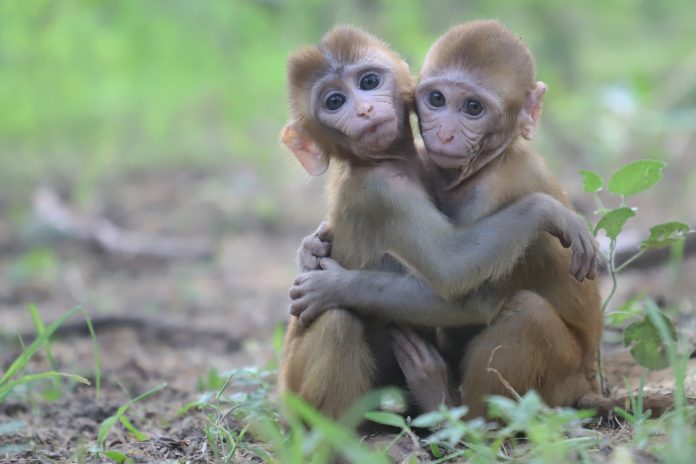In the month of June, the Wildlife SOS Rapid Response Unit rescued two orphaned baby Rhesus macaques in Agra. A 2-month-old male baby Rhesus Macaque lost his mother to electrocution from a high voltage pole while the other, a 3-month old female was found clutching onto her mother, who had died in a collision with a car on the busy road. Both babies were taken to Wildlife SOS’s Animal Care Unit that provides specialized treatment to baby animals.
At first, the monkeys were scared and crying for their mother’s comforting presence so we decided to introduce them to each other. The moment they saw one another, the young monkeys rushed towards each other as if they were long-lost best friends. In the two months they have been with Wildlife SOS, the babies have become inseparable.
This is not the first time our Animal Care Unit has seen such a friendship blossom. In 2019, our team rescued two orphaned baby monkeys after both their mothers had been electrocuted. The two became best friends, finding love, comfort, and compassion in one another.
The loss of a mother for these infants can be as traumatizing of an experience as it is for their human counterparts. We have abundant scientific research that shows the Rhesus macaque has a variety of complex cognitive abilities that make them very similar to humans. They feel the loss of their mother’s love and care just like a human infant would. On realizing she’s gone, they go through stages of grief, often revoking themselves from the company of others. The relationship a baby monkey shares with its mother during infancy is pivotal to its emotional development. Such loss and isolation can be detrimental to the gregarious primate leading to abnormal behavior and increased aggression.
At Wildlife SOS, the treatment of every rescued animal, specifically a baby animal, is viewed from a holistic lens – keeping in mind their physical and mental recovery. Our baby monkeys are given fun enrichments like toys to keep them engaged or as emotional support to hug and sleep at night. Friendship with others like them is a natural healer that we do our best to encourage. Researchers at the University of Exeter who studied the social lives of female macaques on “Monkey Island” (Cayo Santiago, off Puerto Rico) found that female monkeys with a strong bond to another macaque were 11% less likely to die in a year. Wildlife SOS thus sees these bonds as critical to the survival of the baby monkeys.
Thus, the bond of our two new monkey babies came as a relief to everyone. The duo spends their days playing with plush toys, eating meals, or simply napping next to one another. With the trauma of their mothers passing fresh in their minds, the healing powers of their friendship can not be underestimated.
Known for their boisterous antics and human-like social organization, Rhesus macaques are extraordinary creatures. Unfortunately, rapid urban expansion and habitat fragmentation push these animals out of their natural habitats, increasing human-primate conflict. The Wildlife SOS 24- Hour helpline that provides aid to distressed animals around the clock has received innumerable calls about Rhesus monkeys falling victim to road accidents and electrocutions. More and more baby monkeys are being orphaned, posing a massive threat to the ecosystem of the monkeys. Furthermore, Rhesus macaques are subjected to stoning, trapping, and shooting as they are considered pervasive, destructive pests in our cities. Some are even bought and used in the animal entertainment industry as beggars, dancers, or just attractions for tourists and people.
Wildlife SOS is committed to creating a world where humans and animals can co-exist.































